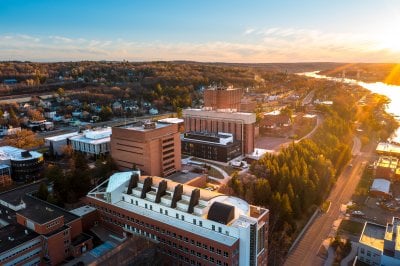Michigan Technological University continues to build momentum, welcoming its largest student body in decades. This fall, Michigan Tech opened its doors to 7,430 students, marking another year of enrollment growth and reflecting the growing demand for a Michigan Tech education.
This year, Michigan Tech's overall enrollment has increased by 110 students, bringing the total to 7,430 — a 1.5% rise from last year. This continues Tech's steady trend of growing enrollment, marking the largest student body on campus since 1982. Undergraduate enrollment has seen a significant boost, up by over 2%. The University also achieved its highest-ever retention rate at 88.7%, reflecting its commitment to student success.
Graduates are also seeing significant returns on their investment, with a median early career salary of $80,300. This strong earning potential contributes to Michigan Tech's rankings by The Wall Street Journal as No. 3 for Best Salaries among public colleges in the U.S. and No. 15 among all colleges.
-
1.5%increase in overall enrollment
-
$80,300median early career salary for grads
-
88.7%retention rate, the highest ever
"I am enthusiastic about Michigan Tech's continued growth," said University President Rick Koubek. "It's a testament to the value our students place on a degree from Tech, which was recently affirmed by our ranking as Michigan's No. 1 public university for salary impact, according to The Wall Street Journal."
Michigan Tech's steady enrollment growth is a result of the Campus Master Plan, which sets a deliberate course of expansion that ensures the University continues to offer a high-quality education while strategically enhancing its campus and resources. By focusing on purposeful growth, MTU is drawing talented students from across the nation and around the world, while maintaining the close-knit community and personalized educational experience the University is known for.
Innovation in Education and Research
Michigan Tech's commitment to advancing education and research is exemplified by the recent opening of the H-STEM Engineering and Health Technology Complex (H-STEM Complex) in April 2024. The H-STEM Complex serves as a hub for interdisciplinary collaboration, offering students hands-on research opportunities in cutting-edge fields such as biomedical engineering, kinesiology and integrative physiology.

The addition of the Bachelor of Science in Nursing program has further boosted enrollment in health disciplines, signifying the University's strategic response to the growing demand for health care professionals. As health care continues to evolve, Michigan Tech remains at the forefront, preparing students to meet the challenges of tomorrow.
"Our new academic programs are playing a key role in driving steady enrollment growth, particularly in fields like health and technology. The H-STEM Complex and the College of Computing exemplify how Michigan Tech is advancing interdisciplinary education and research, offering students hands-on opportunities that prepare them for the demands of tomorrow's industries," said Andrew Storer, provost and senior vice president for academic affairs. "These initiatives not only attract a diverse group of students but also ensure they graduate ready to make a significant impact in their careers. We continue to work to make sure all of our academic programs are of outstanding quality and at the forefront within the discipline areas that they represent."
The emphasis on hands-on, student-led research continues to be a major draw for students, with Michigan Tech positioned to address global challenges through innovative research in areas such as sustainable technologies, advanced computing and cybersecurity. Students are not just participating in these efforts — they are leaders, contributing to projects with real-world impact.
Enhancing the Student Experience

In alignment with the Campus Master Plan, Michigan Tech is committed to enhancing the student experience through significant campus developments. The construction of a new residence hall, designed to accommodate the growing student body, is underway, offering modern and collaborative living spaces that foster a strong sense of community. This new residence hall is part of the University's broader vision to create a vibrant, inclusive campus environment that supports student success both in and out of the classroom.
Following the completion of the new residence hall, the University intends to construct a Center for Convergence and Innovation to further elevate Michigan Tech as a leader in interdisciplinary research and industry collaboration. This facility will be a central component of Tech's efforts to integrate education, research and industry, providing students in both the College of Computing and the College of Business with unparalleled opportunities to engage in collaborative real-world problem-solving.
"It's important that our physical facilities properly reflect the excellence that resides in our students, faculty and staff, which is why we will continue to prioritize investments in our campus infrastructure," said Koubek.
Campus Enhancements in Progress
In alignment with the Campus Master Plan, Michigan Tech is transforming its campus with several key construction projects:
- East Hall Construction: New residence hall for over 500 students, completion expected in fall 2025.
- Rozsa Center for the Performing Arts Bathroom Remodel: Adding public restrooms and wellness rooms, completed in August 2024.
- Daniell Heights Renovations: Upgraded student housing, completed in August 2024.
- McNair Dining Hall Remodel: Overhauled dining and kitchen areas, completed in August 2024.
- John MacInnes Student Ice Arena Upgrades: Improved air handling and dehumidification systems, completed in August 2024.
These projects reflect Michigan Tech's commitment to providing state-of-the-art facilities that support both academic excellence and student well-being.
Expanding Research Impact and Scope
With over $100 million in research expenditures last year, Michigan Tech is solidifying its place among the nation's top research universities. The University continues to expand its research footprint in the Lower Peninsula and beyond, enhancing its capabilities across multiple key research centers. MTU's Translational Health Engineering Research Center (THERC) is set to become a nationally recognized hub for collaboration between industry, researchers and clinicians, driving health research innovation. Additionally, the Michigan Tech Research Institute (MTRI) continues to excel in many research disciplines, including remote sensing and environmental monitoring. Coupled with strategic partnerships at the American Center for Mobility, these initiatives highlight Michigan Tech's commitment to addressing global challenges.
"Michigan Tech's research impact continues to grow, reaching communities locally, regionally, nationally and internationally."
"As we continue to expand our impact in lower Michigan, we can look forward to more success from new additions THERC and ACM, and continued growth from MTRI," said Barnard. "The research success of the University depends on the dedicated students, staff and faculty whose ideas move from ideas to basic and applied research, and eventually transition to products and services that impact people and communities around the world."
Preparing for the Future
As Michigan Tech continues to grow, MTU graduates remain highly sought after by employers. With strong programs in mechanical, chemical and aerospace engineering, as well as a growing focus on emerging fields, the University's industry connections ensure students receive the hands-on experience they need to excel in their careers.
"MTU students are in high demand, and it's easy to see why," said Michelle Scherer, dean of the College of Engineering. "The hands-on experiences they gain, like working in our chemical engineering facility and participating in student-led Enterprises, are remarkable. Our students, including those designing nanosatellites for NASA, handle real projects from start to finish. It's no wonder employers are eager to hire them."
The demand for Michigan Tech graduates remains strong, with a 93% five-year average placement rate. The upcoming fall Career Fair, set for Sept. 24, is expected to be one of the largest in the University's history, with 385 companies recruiting on campus.
Looking forward, Michigan Tech's focus remains on strategic growth that aligns with the evolving needs of students and the demands of industry. This year's overall enrollment is not just a reflection of past success, but a promise of what's to come — a future where Michigan Tech continues to lead in innovation, collaboration and real-world impact.
Michigan Technological University is an R1 public research university founded in 1885 in Houghton, and is home to nearly 7,500 students from more than 60 countries around the world. Consistently ranked among the best universities in the country for return on investment, Michigan's flagship technological university offers more than 120 undergraduate and graduate degree programs in science and technology, engineering, computing, forestry, business, health professions, humanities, mathematics, social sciences, and the arts. The rural campus is situated just miles from Lake Superior in Michigan's Upper Peninsula, offering year-round opportunities for outdoor adventure.





Comments